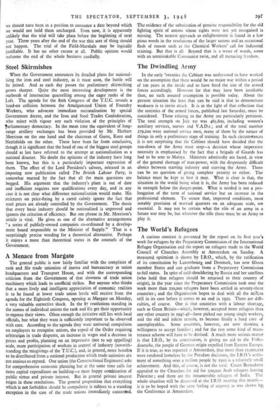The Dwindling Army
In the early 'twenties the Cabinet was understood to have worked on the assumption that there would be no major war within a period of ten years at the inside and to have fixed the size of the armed forces accordingly. However far that may have been justifiable then, no such assured assumption is possible today. About the present situation the least that can be said is that to demonstrate weakness is to invite attack. It is in the light of that reflection that the statistics of the armed forces, published last Saturday, must be considered. Those relating to the Army are particularly pertinent. The total strength on July 1st was 465,800, including women's auxiliary services, nurses and V.A.D.s ; and of the total number 279,200 were national service men, many of them by the nature of things in only a preliminary stage of training. In such circumstances it is not surprising that the Cabinet should have decided that the run-down of the Army must stop—a decision whose imperative necessity is emphasised by the fact that a brigade of Guards has had to be sent to Malaya. Ministers admittedly are faced, in view of the general shortage of man-power, with the desperately difficult choice between starving industry and starving the Army. There can be no question of giving complete priority to either. The balance must be kept as best it may. What is clear is that, the situation in the world being what it is, the Army has been reduced in strength below the danger-point. What is needed is not a pro- longation of the term of national service but an increase in the professional element. To secure that, improved conditions, most notably provision of married quarters on an adequate scale, are essential. It may not be certain what the role of an army in a future war may be, but whatever the role there must be an Army to play it.


































 Previous page
Previous page